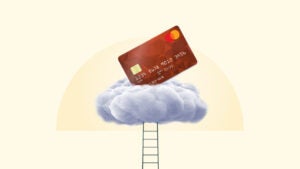Why you should regularly look for a new credit card

Key takaways
- Regularly researching and potentially getting a new credit card can help you maximize perks and rewards.
- If your credit card score has improved or your life circumstances have changed since you initially applied for your current primary credit card, a new card could offer better perks.
- Make sure the new card you choose lines up well with your current spending habits and that the benefits you gain outweigh any associated fees.
If you still have the same primary credit card you signed up for a decade ago, there’s a good chance you’re leaving valuable benefits and rewards on the table. After all, the likelihood of a credit card you picked out long ago still being the best for your wallet is rather small. Not only do new credit cards hit the market all the time, but your spending habits and needs have probably changed quite a bit.
Unfortunately, neglecting to switch up your primary card can mean missing out on perks and not optimizing the rewards you earn. If you find yourself forgetting to redeem credit card rewards, it’s a sign that you don’t have the right card for your needs.
If you haven’t looked for a new credit card in the last few years, you may not know what you’re missing unless you look. Here’s a rundown of several reasons to regularly search for — and possibly get — a new credit card.
1. Earn another sign-up bonus
Adding another credit card to your wallet can help you earn one of the best credit card sign-up bonuses on the market today, which are often worth $500 to $1,000 a pop. Earning a sign-up bonus requires a minimum amount of spending within the first few months, but you may be able to reach the threshold if you use your new card for regular spending and bills.
Bankrate auto loans editor Rebecca Betterton recently picked up the Citi® / AAdvantage® Platinum Select® World Elite Mastercard®* after spotting an elevated introductory bonus.
“My home base is in Charlotte and I travel a good bit,” she says. “I decided to focus my allegiance on American as it’s a hub here.”
At the time, she was able to earn 80,000 bonus miles. The current welcome offer is 75,000 American Airlines AAdvantage® miles if you spend $3,500 within four months of account opening.
“Just last month I was able to book a trip to Denver for myself and my partner — all using those (miles).”
2. Get a card with a better rewards rate
Maybe your old primary card doesn’t offer rewards, or perhaps it has a disappointing earning rate that’s less than you can find with the best credit cards today. In any case, comparing new rewards credit cards can help you get a better deal.
For example, there’s little reason to use a card that earns less than 2 percent cash back since there are several 2 percent back credit cards with no annual fee. There are also cards that offer bonus points in fixed or rotating categories you may be able to maximize, but you’ll never know unless you check.
3. Qualify for an introductory 0% APR offer
If you’re paying debt off on a credit card with a high interest rate, picking up a new card could save you hundreds (or even thousands) of dollars in interest. That’s because an array of cards offer a 0 percent intro APR on purchases, balance transfers or both for as long as 21 months.
As an example, the Wells Fargo Reflect® Card offers a 0 percent intro APR on purchases and qualifying balance transfers for 21 months from account opening. Balance transfers must be made within 120 days of account opening, and a 5 percent balance transfer fee (minimum $5) applies. After the introductory period, a 17.49%, 23.99%, or 28.24% Variable APR applies.
4. If your credit score has improved
Has your credit score improved since you signed up for your current primary card? If so, it’s likely you are now eligible for a much better credit card with a robust selection of perks and features. The fact is, there’s a huge difference between credit cards for fair credit and credit cards for good credit and what they have to offer.
With a good credit score or better, or any FICO Score of 670 or higher, you may be eligible for a credit card with a generous sign-up bonus, a lucrative rewards rate, travel perks and more.
5. If a major life event has changed your needs
Major life events can change the way you spend and use credit. If you have kids, for example, a credit card that lets you earn cash back on grocery purchases, daycare spending, diapers and other household supplies may now be essential. Or, maybe you never traveled much in the past, but a new job has you on the road (or in the air) at least once a month.
Whatever has happened in your life over the last decade or longer, there’s a good chance a different credit card could better suit your updated needs. This could mean switching from a card with no rewards to a cash back credit card, or upgrading to a travel credit card so you have perks like airport lounge access or elite hotel status.
The Citi / AAdvantage Platinum Select World Elite Mastercard’s other travel-related perks helped convince Betterton it was worth the $99 annual fee (waived for the first 12 months).
This card … has an annual fee, which is an important consideration, but for me it felt worthwhile to pay a bit each year for the benefit of early boarding — a perk the card also affords.— Rebecca Betterton, Bankrate Auto Loans Editor
6. If you’re paying too many fees
Maybe your old credit card has an annual fee, and you’re not sure what you’re getting in return, or perhaps your card charges foreign transaction fees when you use it overseas. In any case, there’s no reason to pay regular fees for a card unless you’re absolutely sure the perks you’re getting are well worth it.
If you’re paying fees, and you know the card’s value doesn’t outweigh them, now is a good time to explore new options.
The bottom line
Keeping the card you’ve had forever is probably the easiest thing to do, but it may not be the best. You could be missing out on perks and rewards you don’t even know about, but you won’t find out unless you explore new card offers and give one of them a try. But be strategic — think about how each possible new card would fit your spending habits before you apply.
Betterton offers her advice for choosing a new card:
“Take a look at your budget and consider where you are spending the most money each month. For me, I spend a lot on flights and at the grocery store. I wanted to optimize my spending to get additional flight benefits. My next focus will be to secure a card that boasts benefits for trips to the grocery store.”— Rebecca Betterton, Bankrate Auto Loans Editor
She focuses on one or two cards at a time, which helps her avoid taking a credit score hit from too many hard inquiries in her credit history. It also ensures she can meet spending thresholds in time to earn bonus offers.
Also, remember that this doesn’t mean you have to close your old primary card. In fact, your credit score will likely be better off if you keep old accounts open long-term.
Frequently asked questions about getting new credit cards
*The information about the Citi® / AAdvantage® Platinum Select® World Elite Mastercard® has been collected independently by Bankrate and has not been reviewed or approved by the issuer.
Why we ask for feedback Your feedback helps us improve our content and services. It takes less than a minute to complete.
Your responses are anonymous and will only be used for improving our website.






